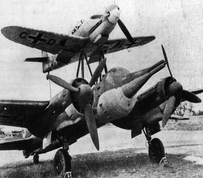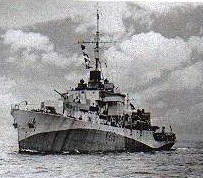Peter
With the exception of about four months on courses, I had spent nearly five years of war in sea-going ships. I was appointed to HMS Nith as First Lieutenant (second-in- command) in Jan/Feb 1944. The ship was at Govan being converted from an anti-submarine escort to a Brigade HQ ship in preparation for the Normandy invasion. This entailed the construction of a special operations room for a Brigadier and his Staff, together with additional communications and alterations to both the officers’ quarters and messdecks to accommodate the Army staff. Our Commanding Officer was Lieutenant Commander Mansfield. We probably came south in late March or early April to be based in the Solent area where exercise landings would have taken place and we probably met up with ‘our’ Army staff during this time. Although not known to me until much later, we were part of Force G, and the 50th Division were to be landed on JUNO beach, not far from Arromanches.
During those previous five years, I had taken part in the bombardment of the French fleet at Mers-el-Kebir; successfully boarded an Italian U-boat; taken part in many ‘club’ runs in the Western Med, based at Gibraltar; Malta convoys; Operation TORCH, the North African landings in Nov 1942; Atlantic convoys, escorting out of Liverpool; and finally in 1943 escorting the minelayers based at Lochalsh in their many ‘lays’ in the Iceland/Faroes area. So I feel I was a fairly hardened naval officer, but, of course, the uncertainty and fear of what lay ahead had not to affect my continual contact with all those in the ship’s company. Added to which, I had become engaged to be married early in 1944, a very personal worry for my private life – Daphne was a Wren Officer serving in the Admiralty in Whitehall with the regular bombing (and V1s and V2s in the offing).
The Channel crossing and the landings have all been recorded many times over. All went well in our sector though our Brigadier (Sir Alexander Stanier Bt.) only remained onboard until about D+3, after which we lost our ‘hourly’ map in the Army Ops Room of how we were doing! We were all subjected to our share of heavy bombardment from the east, the nightly air raids, but aboard we all got into a routine of a ‘relaxed’ action stations environment. I was saddened to read much later that my first destroyer love of 1940/42 (HMS Wrestler) was mined on D-Day whilst on escort duties – a total loss.
Duties of Brigade HQ ship having ended, we embarked a Captain and his staff changing our duties to ‘Captain southbound sailings’ and spent each day directing where the next convoy was to berth for off-loading until the night of 23/24 June when we were attacked by a very secret German air force weapon – MISTEL (German for mistletoe) – an old JU88 loaded with explosives, attached by struts below a fighter aircraft. At my action station aft and on the upper deck, I watched with horror – what was to happen? A moonlight night added to the drama. I ordered everyone to lie down and I watched as the unmanned JU88 was released by the mother plane (a ME109) and targeted on us. The wing of the plane cut in half the sea-boat turned outboard in readiness and crashed alongside with an enormous explosion.
Real action then followed onboard. There were quite a few casualties – I think about 8 dead, with one more dying soon after, and many injured; and of course fire-fighting and damage control (flooding, etc). The ship lost power, developed quite a list and both boilers were put out of action. Before leaving the beachhead we had to arrange the funerals of the deceased. This entailed wrapping the bodies in canvas, putting heavy weights therein – usually shells – and committing the bodies to the deep. As an aside, I have a recollection of bodies floating by the ship – not sufficiently weighted – so I hope no Nith casualties suffered that indignity.
(Years later – 1999 or 1998 – there was correspondence in The DailyTelegraph about kamikazes and I was bold enough to write to the Peterborough column and quote the above attack in the German context. My letter was referred to the Imperial War Museum, who simply refused to accept that the Germans had such a capability. An author has on his own initiative been working on this – interviewed some of the German pilots etc, and when he somehow heard that we were a VERY near miss, grabbed HMS Nith with open arms! The book was printed in 2001 and I await my complimentary copy daily! I hope he sends a copy to the Imperial War Museum.)
Subsequently we were towed back to Samuel Whites at Cowes for repairs – I got married – and we returned to the beaches on another duty on the eastern flank about early August. The CO had by then changed, the new one being Lieutenant Commander The Hon Greville Howard RNVR.
I left the ship at the end of the year and was appointed to the fleet destroyer HMS Venus, again as No 1, which sailed for the East Indies fleet almost at once, with the future aim of fighting the Japanese. In May 1945 Venus was one of five fleet destroyers that surprised a southbound large 8-inch gun Japanese cruiser and in a classic destroyer night action, sank Haguro with torpedoes.
Soon after the BOMB was dropped and we were home for Christmas – and what we hoped was a lasting PEACE.
Daphne
When asked to write about D-Day I had hoped that my 1944 diary would jog my memory, but I found it disappointingly laconic; the only entry for 6 June 1944 is ‘Allied forces invaded France this morning’, and not much more on subsequent days. So I had to think without the aid of my diary of memories of that time that I hope you find interesting.
I had trained as an RT/RP Wren at Yeovilton, and returned there after I had been given my commission, to attend the Fighter Direction Officers’ Course. On completion, I am not sure if I was sorry or pleased to be posted to the Admiralty in the Air Warfare and Training Division. Sorry, because it meant no contact with all the interest and excitement of life on a naval air station, but pleased because my parents lived at Walton-on-Thames and I could live with them and go by train to London daily. I had been engaged to Peter since January 1944, and as his parents lived not far from mine. So I would be able to see him on the few occasions when he came home on leave, knowing that his ship, HMS Nith, would be involved in the D-Day landings. It also meant that I learnt a bit about the workings of the Admiralty and my way round the many floors and corridors, and also I was able to read all the signals – except the Secret ones – which came into the Division daily. So the various code names became familiar and one was aware that the Second Front was imminent.
We had had air raids for over three and a half years, but in the summer of 1944 the infamous V1 pilotless planes started to come over the coast and make for London. One recognised the unmistakable noise of their engines and, if they got too near, scrambled down onto the floor, or preferably, under a desk. One selfishly hoped that the engine wouldn’t cut out until it was past, because, if it did, it meant it was about to descend in the near vicinity. Selfishly because, if the engine continued, one knew it would fall somewhere else.
I had an elder brother in the Navy, as well as a fiancé; both involved in the D-Day landings, so I remember great anxiety about what was happening to all our forces in general, but about them in particular. But then there had been anxiety for friends and family for so many years that it had become an accepted state of mind. It was a ritual, if possible, to listen every evening to the 9 o’clock news, proceeded always by the chimes of Big Ben and all nine strikes.
On 24 June my fiance’s ship, HMS Nith, was hit and badly damaged by what was subsequently identified as a German unmanned bomber, released over the target by a piloted fighter aircraft and known as MISTEL. The ship came back for repairs at Samuel White’s shipyard at Cowes. On 28 June I had a telegram from Peter saying ‘fix our wedding for July 8th’ – not much notice, but with much family help, we managed it, with a week or so in hand before he had to return to the ship, which then went back to Normandy.

A Mistel

HMS Nith
